文章对应视频教程:
暂无,可以关注我的B站账号等待更新。
1、引言
在嵌入式开发领域,FatFs以其实现的简洁性和对多种存储媒介的支持而著称。本文旨在通过一个具体实例——在RAM中构建FatFs文件系统,来阐述FatFs的移植过程。这一实践不仅有助于理解FatFs的工作机制,也为开发者提供了一个高效测试和验证FatFs配置的平台。
2、环境准备
环境搭建:确保你的开发环境支持ANSI C标准,通常使用GCC或其他兼容编译器。
我们本次演示采用之前博客中介绍过的Cmake+Kconfig的项目构建。
2.1 下载源码
fatfs的官网 官网链接。
进入官网,拖动网页到最下方:

点击图中的橙色框,进行下载,注意下载的为R0.15版本。

打开进行解压。
2.2 创建一个工程
从之前的cmake+kconfig的项目复制出一个工程。

修改工程名:
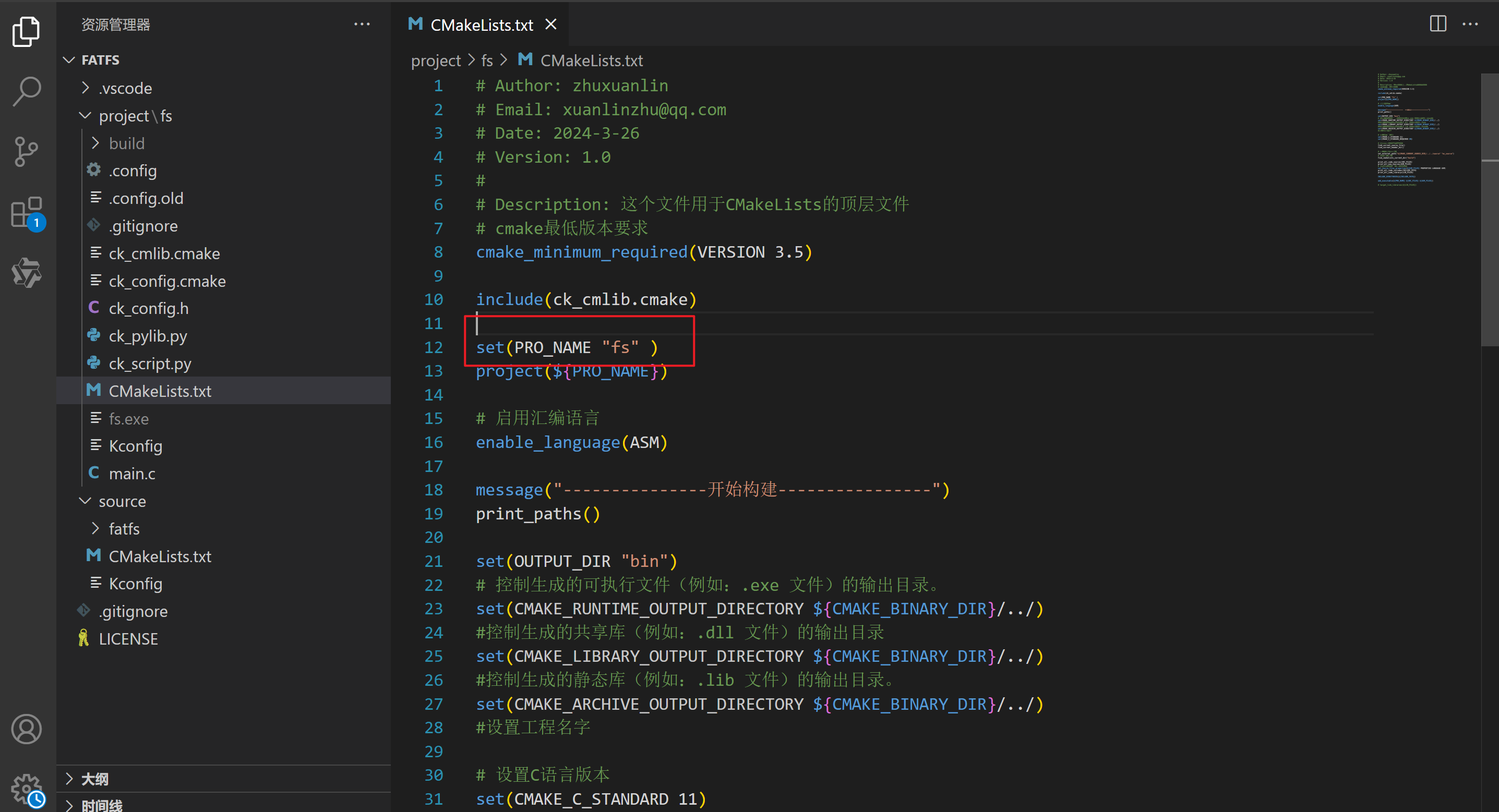
复制之前下载的fatfs源码中source文件夹下的7个文件的到source\fatfs文件夹下:
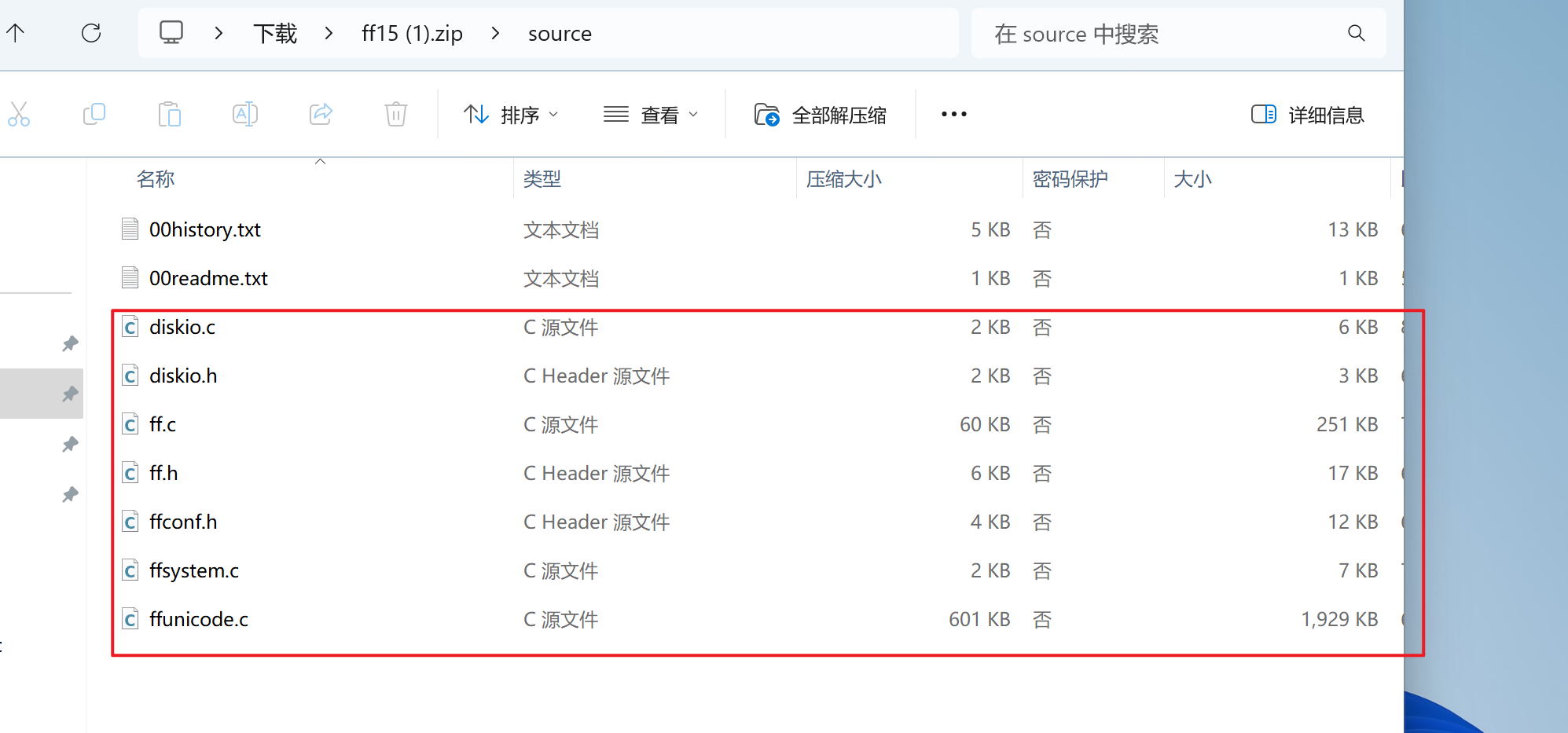
在source\fatfs\Kconfig文件内容如下,因为引入了RAM文件系统的大小配置。
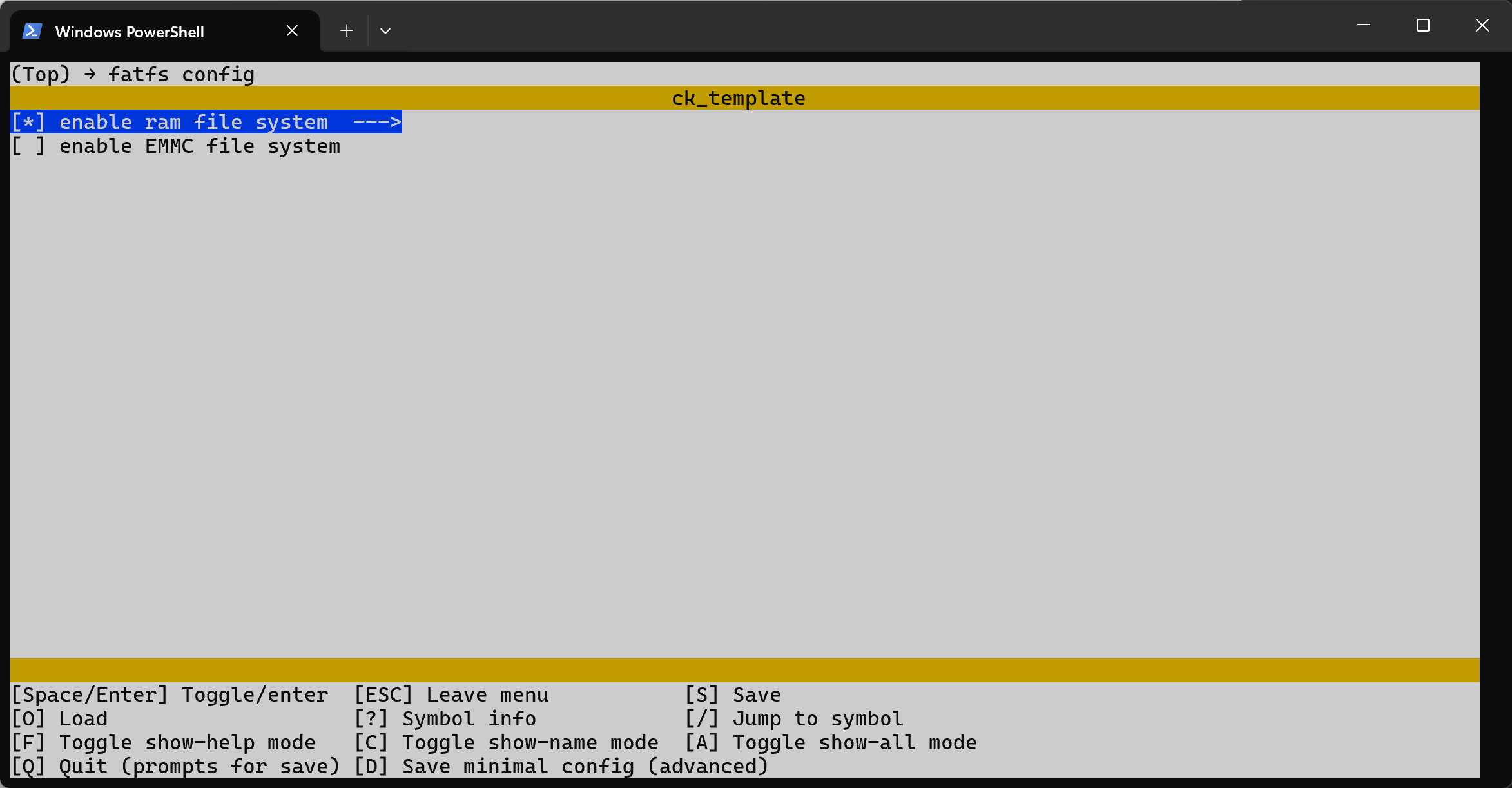
# source of Kconfig
menuconfig FATFS_ENABLE
bool "fatfs config"
default n
if FATFS_ENABLE
menuconfig FATFS_RAM_ENABLE
bool "enable ram file system"
default n
if FATFS_RAM_ENABLE
config FATFS_RAM_POOL_SIZE
int "ram file system size"
default 102400
endif
config FATFS_EMMC_ENABLE
bool "enable EMMC file system"
default n
endif
3、移植
移植fatfs主要是更改fatfs的配置和完善fatfs的读写驱动。
3.1 修改配置
打开ffconf.h文件,根据自己的应用需要进行修改。
我的配置文件如下:
/*---------------------------------------------------------------------------/
/ Configurations of FatFs Module
/---------------------------------------------------------------------------*/
#define FFCONF_DEF 80286 /* Revision ID */
/*---------------------------------------------------------------------------/
/ Function Configurations
/---------------------------------------------------------------------------*/
#define FF_FS_READONLY 0
/* This option switches read-only configuration. (0:Read/Write or 1:Read-only)
/ Read-only configuration removes writing API functions, f_write(), f_sync(),
/ f_unlink(), f_mkdir(), f_chmod(), f_rename(), f_truncate(), f_getfree()
/ and optional writing functions as well. */
#define FF_FS_MINIMIZE 0
/* This option defines minimization level to remove some basic API functions.
/
/ 0: Basic functions are fully enabled.
/ 1: f_stat(), f_getfree(), f_unlink(), f_mkdir(), f_truncate() and f_rename()
/ are removed.
/ 2: f_opendir(), f_readdir() and f_closedir() are removed in addition to 1.
/ 3: f_lseek() function is removed in addition to 2. */
#define FF_USE_FIND 1
/* This option switches filtered directory read functions, f_findfirst() and
/ f_findnext(). (0:Disable, 1:Enable 2:Enable with matching altname[] too) */
#define FF_USE_MKFS 1
/* This option switches f_mkfs() function. (0:Disable or 1:Enable) */
#define FF_USE_FASTSEEK 1
/* This option switches fast seek function. (0:Disable or 1:Enable) */
#define FF_USE_EXPAND 0
/* This option switches f_expand function. (0:Disable or 1:Enable) */
#define FF_USE_CHMOD 1
/* This option switches attribute manipulation functions, f_chmod() and f_utime().
/ (0:Disable or 1:Enable) Also FF_FS_READONLY needs to be 0 to enable this option. */
#define FF_USE_LABEL 1
/* This option switches volume label functions, f_getlabel() and f_setlabel().
/ (0:Disable or 1:Enable) */
#define FF_USE_FORWARD 1
/* This option switches f_forward() function. (0:Disable or 1:Enable) */
#define FF_USE_STRFUNC 1
#define FF_PRINT_LLI 1
#define FF_PRINT_FLOAT 1
#define FF_STRF_ENCODE 3
/* FF_USE_STRFUNC switches string functions, f_gets(), f_putc(), f_puts() and
/ f_printf().
/
/ 0: Disable. FF_PRINT_LLI, FF_PRINT_FLOAT and FF_STRF_ENCODE have no effect.
/ 1: Enable without LF-CRLF conversion.
/ 2: Enable with LF-CRLF conversion.
/
/ FF_PRINT_LLI = 1 makes f_printf() support long long argument and FF_PRINT_FLOAT = 1/2
/ makes f_printf() support floating point argument. These features want C99 or later.
/ When FF_LFN_UNICODE >= 1 with LFN enabled, string functions convert the character
/ encoding in it. FF_STRF_ENCODE selects assumption of character encoding ON THE FILE
/ to be read/written via those functions.
/
/ 0: ANSI/OEM in current CP
/ 1: Unicode in UTF-16LE
/ 2: Unicode in UTF-16BE
/ 3: Unicode in UTF-8
*/
/*---------------------------------------------------------------------------/
/ Locale and Namespace Configurations
/---------------------------------------------------------------------------*/
#define FF_CODE_PAGE 936
/* This option specifies the OEM code page to be used on the target system.
/ Incorrect code page setting can cause a file open failure.
/
/ 437 - U.S.
/ 720 - Arabic
/ 737 - Greek
/ 771 - KBL
/ 775 - Baltic
/ 850 - Latin 1
/ 852 - Latin 2
/ 855 - Cyrillic
/ 857 - Turkish
/ 860 - Portuguese
/ 861 - Icelandic
/ 862 - Hebrew
/ 863 - Canadian French
/ 864 - Arabic
/ 865 - Nordic
/ 866 - Russian
/ 869 - Greek 2
/ 932 - Japanese (DBCS)
/ 936 - Simplified Chinese (DBCS)
/ 949 - Korean (DBCS)
/ 950 - Traditional Chinese (DBCS)
/ 0 - Include all code pages above and configured by f_setcp()
*/
#define FF_USE_LFN 2
#define FF_MAX_LFN 255
/* The FF_USE_LFN switches the support for LFN (long file name).
/
/ 0: Disable LFN. FF_MAX_LFN has no effect.
/ 1: Enable LFN with static working buffer on the BSS. Always NOT thread-safe.
/ 2: Enable LFN with dynamic working buffer on the STACK.
/ 3: Enable LFN with dynamic working buffer on the HEAP.
/
/ To enable the LFN, ffunicode.c needs to be added to the project. The LFN function
/ requiers certain internal working buffer occupies (FF_MAX_LFN + 1) * 2 bytes and
/ additional (FF_MAX_LFN + 44) / 15 * 32 bytes when exFAT is enabled.
/ The FF_MAX_LFN defines size of the working buffer in UTF-16 code unit and it can
/ be in range of 12 to 255. It is recommended to be set it 255 to fully support LFN
/ specification.
/ When use stack for the working buffer, take care on stack overflow. When use heap
/ memory for the working buffer, memory management functions, ff_memalloc() and
/ ff_memfree() exemplified in ffsystem.c, need to be added to the project. */
#define FF_LFN_UNICODE 2
/* This option switches the character encoding on the API when LFN is enabled.
/
/ 0: ANSI/OEM in current CP (TCHAR = char)
/ 1: Unicode in UTF-16 (TCHAR = WCHAR)
/ 2: Unicode in UTF-8 (TCHAR = char)
/ 3: Unicode in UTF-32 (TCHAR = DWORD)
/
/ Also behavior of string I/O functions will be affected by this option.
/ When LFN is not enabled, this option has no effect. */
#define FF_LFN_BUF 255
#define FF_SFN_BUF 12
/* This set of options defines size of file name members in the FILINFO structure
/ which is used to read out directory items. These values should be suffcient for
/ the file names to read. The maximum possible length of the read file name depends
/ on character encoding. When LFN is not enabled, these options have no effect. */
#define FF_FS_RPATH 2
/* This option configures support for relative path.
/
/ 0: Disable relative path and remove related functions.
/ 1: Enable relative path. f_chdir() and f_chdrive() are available.
/ 2: f_getcwd() function is available in addition to 1.
*/
/*---------------------------------------------------------------------------/
/ Drive/Volume Configurations
/---------------------------------------------------------------------------*/
#define FF_VOLUMES 2
/* Number of volumes (logical drives) to be used. (1-10) */
#define FF_STR_VOLUME_ID 1
#define FF_VOLUME_STRS "RAM","EMMC"
/* FF_STR_VOLUME_ID switches support for volume ID in arbitrary strings.
/ When FF_STR_VOLUME_ID is set to 1 or 2, arbitrary strings can be used as drive
/ number in the path name. FF_VOLUME_STRS defines the volume ID strings for each
/ logical drives. Number of items must not be less than FF_VOLUMES. Valid
/ characters for the volume ID strings are A-Z, a-z and 0-9, however, they are
/ compared in case-insensitive. If FF_STR_VOLUME_ID >= 1 and FF_VOLUME_STRS is
/ not defined, a user defined volume string table is needed as:
/
/ const char* VolumeStr[FF_VOLUMES] = {"ram","flash","sd","usb",...
*/
#define FF_MULTI_PARTITION 0
/* This option switches support for multiple volumes on the physical drive.
/ By default (0), each logical drive number is bound to the same physical drive
/ number and only an FAT volume found on the physical drive will be mounted.
/ When this function is enabled (1), each logical drive number can be bound to
/ arbitrary physical drive and partition listed in the VolToPart[]. Also f_fdisk()
/ function will be available. */
#define FF_MIN_SS 512
#define FF_MAX_SS 512
/* This set of options configures the range of sector size to be supported. (512,
/ 1024, 2048 or 4096) Always set both 512 for most systems, generic memory card and
/ harddisk, but a larger value may be required for on-board flash memory and some
/ type of optical media. When FF_MAX_SS is larger than FF_MIN_SS, FatFs is configured
/ for variable sector size mode and disk_ioctl() function needs to implement
/ GET_SECTOR_SIZE command. */
#define FF_LBA64 1
/* This option switches support for 64-bit LBA. (0:Disable or 1:Enable)
/ To enable the 64-bit LBA, also exFAT needs to be enabled. (FF_FS_EXFAT == 1) */
#define FF_MIN_GPT 0x10000000
/* Minimum number of sectors to switch GPT as partitioning format in f_mkfs and
/ f_fdisk function. 0x100000000 max. This option has no effect when FF_LBA64 == 0. */
#define FF_USE_TRIM 0
/* This option switches support for ATA-TRIM. (0:Disable or 1:Enable)
/ To enable Trim function, also CTRL_TRIM command should be implemented to the
/ disk_ioctl() function. */
/*---------------------------------------------------------------------------/
/ System Configurations
/---------------------------------------------------------------------------*/
#define FF_FS_TINY 0
/* This option switches tiny buffer configuration. (0:Normal or 1:Tiny)
/ At the tiny configuration, size of file object (FIL) is shrinked FF_MAX_SS bytes.
/ Instead of private sector buffer eliminated from the file object, common sector
/ buffer in the filesystem object (FATFS) is used for the file data transfer. */
#define FF_FS_EXFAT 1
/* This option switches support for exFAT filesystem. (0:Disable or 1:Enable)
/ To enable exFAT, also LFN needs to be enabled. (FF_USE_LFN >= 1)
/ Note that enabling exFAT discards ANSI C (C89) compatibility. */
#define FF_FS_NORTC 1
#define FF_NORTC_MON 1
#define FF_NORTC_MDAY 1
#define FF_NORTC_YEAR 2022
/* The option FF_FS_NORTC switches timestamp feature. If the system does not have
/ an RTC or valid timestamp is not needed, set FF_FS_NORTC = 1 to disable the
/ timestamp feature. Every object modified by FatFs will have a fixed timestamp
/ defined by FF_NORTC_MON, FF_NORTC_MDAY and FF_NORTC_YEAR in local time.
/ To enable timestamp function (FF_FS_NORTC = 0), get_fattime() function need to be
/ added to the project to read current time form real-time clock. FF_NORTC_MON,
/ FF_NORTC_MDAY and FF_NORTC_YEAR have no effect.
/ These options have no effect in read-only configuration (FF_FS_READONLY = 1). */
#define FF_FS_NOFSINFO 0
/* If you need to know correct free space on the FAT32 volume, set bit 0 of this
/ option, and f_getfree() function at the first time after volume mount will force
/ a full FAT scan. Bit 1 controls the use of last allocated cluster number.
/
/ bit0=0: Use free cluster count in the FSINFO if available.
/ bit0=1: Do not trust free cluster count in the FSINFO.
/ bit1=0: Use last allocated cluster number in the FSINFO if available.
/ bit1=1: Do not trust last allocated cluster number in the FSINFO.
*/
#define FF_FS_LOCK 0
/* The option FF_FS_LOCK switches file lock function to control duplicated file open
/ and illegal operation to open objects. This option must be 0 when FF_FS_READONLY
/ is 1.
/
/ 0: Disable file lock function. To avoid volume corruption, application program
/ should avoid illegal open, remove and rename to the open objects.
/ >0: Enable file lock function. The value defines how many files/sub-directories
/ can be opened simultaneously under file lock control. Note that the file
/ lock control is independent of re-entrancy. */
#define FF_FS_REENTRANT 0
#define FF_FS_TIMEOUT 1000
/* The option FF_FS_REENTRANT switches the re-entrancy (thread safe) of the FatFs
/ module itself. Note that regardless of this option, file access to different
/ volume is always re-entrant and volume control functions, f_mount(), f_mkfs()
/ and f_fdisk() function, are always not re-entrant. Only file/directory access
/ to the same volume is under control of this featuer.
/
/ 0: Disable re-entrancy. FF_FS_TIMEOUT have no effect.
/ 1: Enable re-entrancy. Also user provided synchronization handlers,
/ ff_mutex_create(), ff_mutex_delete(), ff_mutex_take() and ff_mutex_give()
/ function, must be added to the project. Samples are available in ffsystem.c.
/
/ The FF_FS_TIMEOUT defines timeout period in unit of O/S time tick.
*/
/*--- End of configuration options ---*/
3.2 修改diskio.c
fatfs的驱动接口在diskio.c文件中,这个版本的fatfs提供了三种类型的驱动接口,
RAM、MMC、Flash,我只需要其中RAM、MMC。所以对diskio.c文件进行了微调,并将不同的设备驱动,放在别的文件了(利于软件分层)。大家如果嫌麻烦,也可以直接在diskio.c文件下添加内容。
diskio.c内容如下:
/*-----------------------------------------------------------------------*/
/* Low level disk I/O module SKELETON for FatFs (C)ChaN, 2019 */
/*-----------------------------------------------------------------------*/
/* If a working storage control module is available, it should be */
/* attached to the FatFs via a glue function rather than modifying it. */
/* This is an example of glue functions to attach various exsisting */
/* storage control modules to the FatFs module with a defined API. */
/*-----------------------------------------------------------------------*/
#include "ff.h" /* Obtains integer types */
#include "diskio.h" /* Declarations of disk functions */
#include "ck_config.h"
#ifdef FATFS_RAM_ENABLE
#include "fs_ram.h"
#endif
#ifdef FATFS_EMMC_ENABLE
#include "fs_emmc.h"
#endif
/* Definitions of physical drive number for each drive */
#define DEV_RAM 0
#define DEV_MMC 1
/*-----------------------------------------------------------------------*/
/* Get Drive Status */
/*-----------------------------------------------------------------------*/
DSTATUS disk_status (
BYTE pdrv /* Physical drive nmuber to identify the drive */
)
{
DSTATUS stat;
int result;
switch (pdrv)
{
case DEV_RAM :
#ifdef FATFS_RAM_ENABLE
stat = RAM_disk_status();
#endif
return stat;
case DEV_MMC :
#ifdef FATFS_EMMC_ENABLE
stat = EMMC_disk_status();
#endif
return stat;
default:
break;
}
return STA_NOINIT;
}
/*-----------------------------------------------------------------------*/
/* Inidialize a Drive */
/*-----------------------------------------------------------------------*/
DSTATUS disk_initialize (
BYTE pdrv /* Physical drive nmuber to identify the drive */
)
{
DSTATUS stat;
int result;
switch (pdrv) {
case DEV_RAM :
#ifdef FATFS_RAM_ENABLE
stat = RAM_disk_initialize();
#endif
return stat;
case DEV_MMC :
#ifdef FATFS_EMMC_ENABLE
stat = EMMC_disk_initialize();
#endif
return stat;
}
return STA_NOINIT;
}
/*-----------------------------------------------------------------------*/
/* Read Sector(s) */
/*-----------------------------------------------------------------------*/
DRESULT disk_read (
BYTE pdrv, /* Physical drive nmuber to identify the drive */
BYTE *buff, /* Data buffer to store read data */
LBA_t sector, /* Start sector in LBA */
UINT count /* Number of sectors to read */
)
{
DRESULT res;
int result;
switch (pdrv) {
case DEV_RAM :
#ifdef FATFS_RAM_ENABLE
res = RAM_disk_read(buff, sector, count);
#endif
return res;
case DEV_MMC :
#ifdef FATFS_EMMC_ENABLE
res = EMMC_disk_read(buff, sector, count);
#endif
return res;
}
return RES_PARERR;
}
/*-----------------------------------------------------------------------*/
/* Write Sector(s) */
/*-----------------------------------------------------------------------*/
#if FF_FS_READONLY == 0
DRESULT disk_write (
BYTE pdrv, /* Physical drive nmuber to identify the drive */
const BYTE *buff, /* Data to be written */
LBA_t sector, /* Start sector in LBA */
UINT count /* Number of sectors to write */
)
{
DRESULT res;
int result;
switch (pdrv) {
case DEV_RAM :
#ifdef FATFS_RAM_ENABLE
res = RAM_disk_write(buff, sector, count);
#endif
return res;
case DEV_MMC :
#ifdef FATFS_EMMC_ENABLE
res = EMMC_disk_write(buff, sector, count);
#endif
return res;
}
return RES_PARERR;
}
#endif
/*-----------------------------------------------------------------------*/
/* Miscellaneous Functions */
/*-----------------------------------------------------------------------*/
DRESULT disk_ioctl (
BYTE pdrv, /* Physical drive nmuber (0..) */
BYTE cmd, /* Control code */
void *buff /* Buffer to send/receive control data */
)
{
DRESULT res;
int result;
switch (pdrv) {
case DEV_RAM :
#ifdef FATFS_RAM_ENABLE
res = RAM_disk_ioctl(cmd,buff);
#endif
// Process of the command for the RAM drive
return res;
case DEV_MMC :
#ifdef FATFS_EMMC_ENABLE
res = EMMC_disk_ioctl(cmd,buff);
#endif
// Process of the command for the MMC/SD card
return res;
}
return RES_PARERR;
}
3.3 编写RAM驱动
在source\fatfs\fs_ram路径下创建RAM的驱动。
只需要编写几个函数init、status、ioctl、read、write即可。
fs_ram.c内容如下:
#include "fs_ram.h"
#include "string.h" // 用于 memcpy
#include "ck_config.h"
#define RAM_DISK_SIZE (FATFS_RAM_POOL_SIZE)
#define SECTOR_SIZE 512
static BYTE ram_disk[RAM_DISK_SIZE];
static DSTATUS ram_disk_status = STA_NOINIT; // 初始状态为未初始化
DSTATUS RAM_disk_initialize(void) {
// RAM 磁盘无需复杂初始化,直接标记为正常
ram_disk_status = 0;
return ram_disk_status;
}
DSTATUS RAM_disk_status(void) {
return ram_disk_status;
}
DRESULT RAM_disk_read(BYTE* buff, DWORD sector, UINT count) {
if (ram_disk_status & STA_NOINIT) {
return RES_NOTRDY; // 磁盘未准备好
}
if (sector + count > RAM_DISK_SIZE / SECTOR_SIZE) {
return RES_PARERR; // 超出范围
}
memcpy(buff, ram_disk + sector * SECTOR_SIZE, count * SECTOR_SIZE);
return RES_OK;
}
DRESULT RAM_disk_write(const BYTE* buff, DWORD sector, UINT count) {
if (ram_disk_status & STA_NOINIT) {
return RES_NOTRDY; // 磁盘未准备好
}
if (sector + count > RAM_DISK_SIZE / SECTOR_SIZE) {
return RES_PARERR; // 超出范围
}
memcpy(ram_disk + sector * SECTOR_SIZE, buff, count * SECTOR_SIZE);
return RES_OK;
}
DRESULT RAM_disk_ioctl(BYTE cmd, void* buff) {
if (ram_disk_status & STA_NOINIT) {
return RES_NOTRDY; // 磁盘未准备好
}
switch (cmd) {
case CTRL_SYNC:
// RAM 磁盘不需要同步操作
return RES_OK;
case GET_SECTOR_COUNT:
*(DWORD*)buff = RAM_DISK_SIZE / SECTOR_SIZE;
return RES_OK;
case GET_SECTOR_SIZE:
*(WORD*)buff = SECTOR_SIZE;
return RES_OK;
case GET_BLOCK_SIZE:
// 返回擦除块大小
*(DWORD*)buff = 1; // 任意大小,RAM 不需要真正的擦除操作
return RES_OK;
default:
return RES_PARERR;
}
}
fs_ram.h内容如下:
#ifndef __FS_RAM_H__
#define __FS_RAM_H__
#include "ff.h"
#include "diskio.h"
extern DSTATUS RAM_disk_initialize(void);
extern DSTATUS RAM_disk_status(void);
extern DRESULT RAM_disk_read(BYTE* buff, DWORD sector, UINT count);
extern DRESULT RAM_disk_write(const BYTE* buff, DWORD sector, UINT count);
extern DRESULT RAM_disk_ioctl(BYTE cmd, void* buff);
#endif
3.4 编写验证代码
在工程路径下的main.c中编写测试代码。
这段测试代码主要是:
挂载文件系统:通过调用f_mount函数将文件系统挂载到指定的存储设备上。
格式化RAM磁盘:使用f_mkfs函数对指定的存储设备进行格式化,创建FAT文件系统。
创建并写入文件:使用f_open函数创建一个新文件或打开已存在的文件,然后使用f_write函数将数据写入文件。
读取文件内容:使用f_open函数打开文件,然后使用f_read函数从文件中读取数据。
卸载文件系统:通过调用f_mount函数将文件系统从存储设备上卸载。
内容如下:
#include "ff.h"
#include <stdio.h>
#include <string.h>
static char mkfs_buff[1024*24];
int main(void) {
FATFS fs;
FIL fil;
FRESULT res;
UINT bw;
char buffer[64];
// 挂载文件系统
res = f_mount(&fs, "EMMC:", 0);
if (res != FR_OK) {
printf("f_mount error: %d\n", res);
return 1;
}
// 格式化 RAM 磁盘
MKFS_PARM fs_params = { FM_FAT, 0, 0, 0, 0 };
res = f_mkfs("EMMC:", &fs_params, mkfs_buff, sizeof(mkfs_buff));
if (res != FR_OK) {
printf("f_mkfs error: %d\n", res);
return 1;
}
TCHAR path[255];
res = f_open(&fil, "hello.txt", FA_CREATE_ALWAYS | FA_WRITE | FA_READ);
if (res != FR_OK) {
printf("f_open error: %d\n", res);
return 1;
}
printf("path:%d %s\r\n",f_getcwd(path, 255),path);
// 写入文件
char str[64] = "hello world!";
res = f_write(&fil, str, sizeof(str), &bw);
if (res != FR_OK ) {
printf("f_write error: %d\n", res);
f_close(&fil);
return 1;
}
f_close(&fil);
// 打开文件读取内容
res = f_open(&fil, "hello.txt", FA_READ);
if (res != FR_OK) {
printf("f_open error: %d\n", res);
return 1;
}
// 读取文件内容
res = f_read(&fil, buffer, sizeof(buffer) - 1, &bw);
if (res != FR_OK) {
printf("f_read error: %d\n", res);
f_close(&fil);
return 1;
}
buffer[bw] = '\0'; // 添加字符串结束符
printf("Read from file: %s\n", buffer);
f_close(&fil);
// 卸载文件系统
f_mount(NULL, "", 0);
return 0;
}
4、验证
在工程路径下输入python .\ck_script.py cn进行配置,开启fatfs使能。

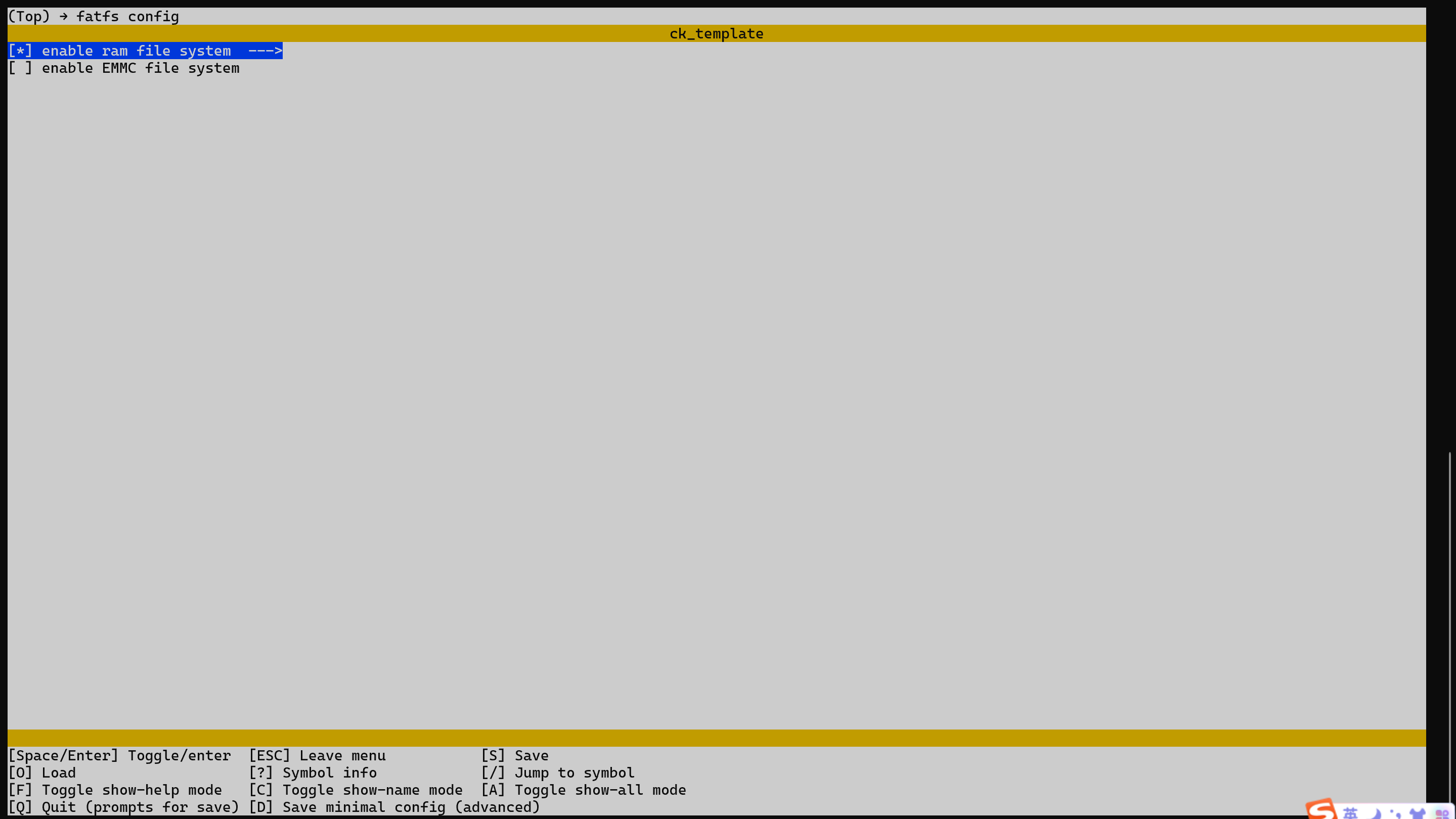
在工程路径下输入python .\ck_script.py b,进行工程构建。
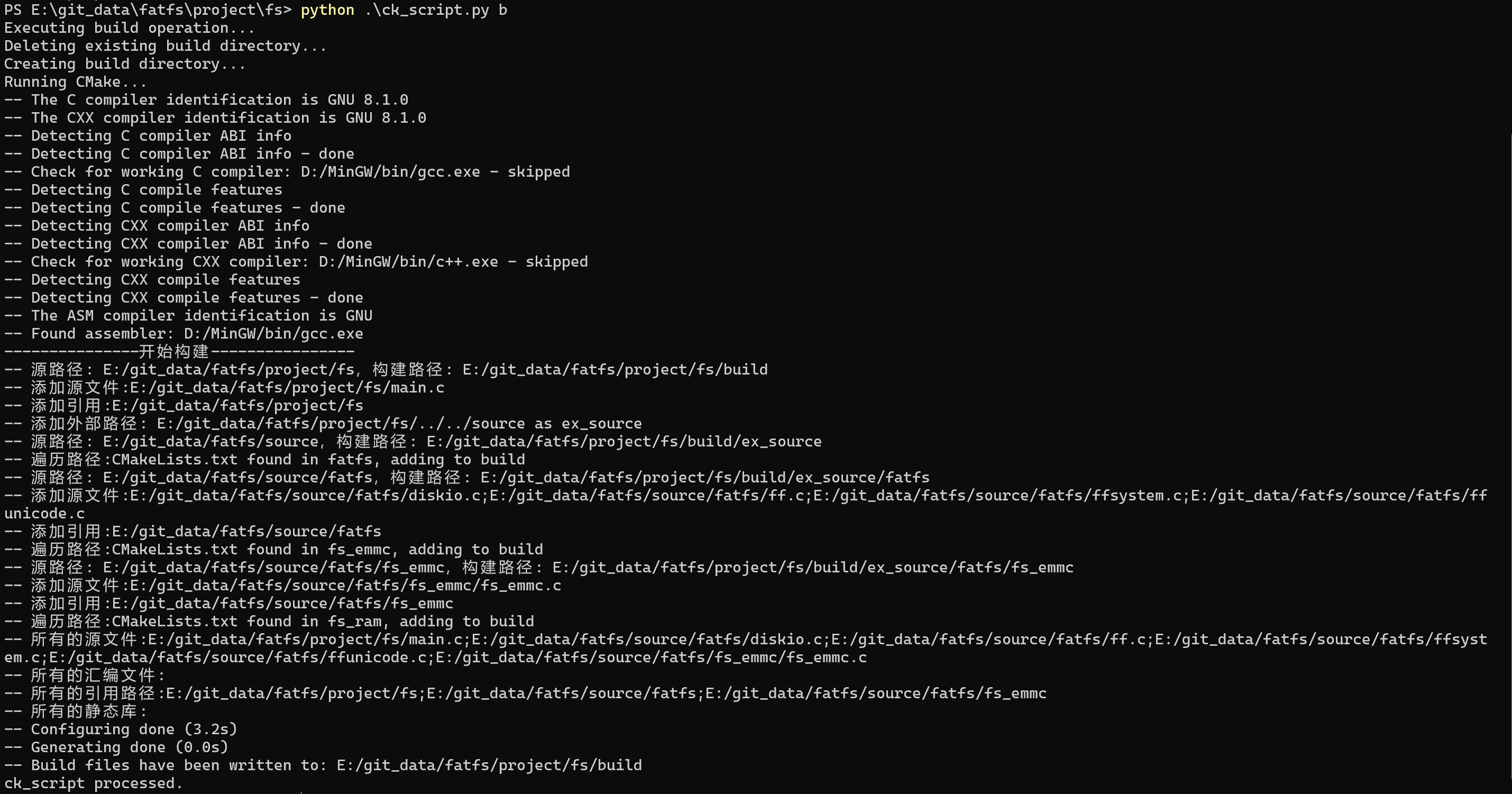
在工程路径下输入python .\ck_script.py m,进行项目编译。

执行程序,验证fatfs文件系统

移植成功!
时间流逝、年龄增长,是自己的磨炼、对知识技术的应用,还有那不变的一颗对嵌入式热爱的心!

点赞o( ̄▽ ̄)d、关注(o)/~、评论(▽)!
























 2万+
2万+











 被折叠的 条评论
为什么被折叠?
被折叠的 条评论
为什么被折叠?










